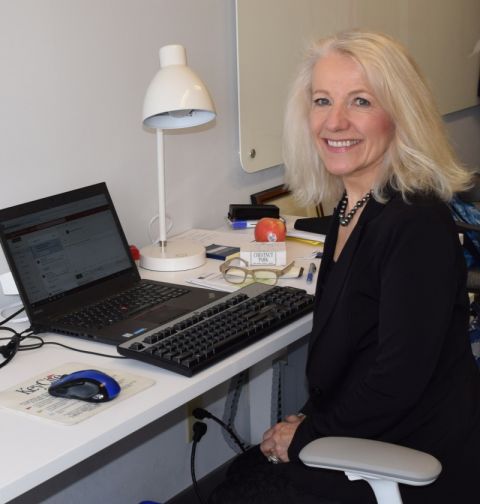
Medical malpractice, personal injury, defamation, sexual assault. These are among the types of cases decided in civil courts. Justice Darla Wilson, Law’84 (Artsci’81), has heard many such cases argued before her at the Superior Court of Justice in Toronto over the past 12 years. Wilson, previously a civil litigator, is visiting Queen’s Law this academic year to draft instructions for Ontario judges to prepare their jurors for civil trials, and to interact with students and faculty.
The project she is working on will help both judges and juries in the province.
“In a civil case, jurors decide on very serious issues involving negligent, unreasonable or substandard conduct,” she explains. “These decisions affect people’s lives. But jurors are non-law people who have no experience with trials. It’s the judge’s job to ‘charge’ (instruct) the jury on the process and on the law that applies to the individual case. However, Ontario’s civil jury charges are outdated and not easily accessible to the bench.”
The idea of drafting updated model instructions for judges to give to their civil jurors came about at a judges’ educational conference in Vancouver two years ago, when Wilson caught up with Associate Dean (Academic) Erik Knutsen, an expert in tort law and civil procedure. “I explained to Erik that I had done a great deal of work as a judge in jury trials on medical malpractice – one of the most complicated areas – but the charges are from the 1990s and not online. There are also a lot of judges who’ve never had a jury trial (only Judge-alone) and contact me to help with the charge. Justice David Watt (Law’70) of the Ontario Court of Appeal updated the criminal jury charges and they’re all online. Erik suggested I might do the same thing for civil jury charges.”
A judicial colleague suggested that she apply for a study leave to get the time for such an onerous job. She did just that, sending her proposal to then-Chief Justice Heather Forster-Smith, Law’71 (who retired on June 30, 2019), who “heartily recommended” it to the Canadian Judicial Council.
By updating the civil jury charges, Wilson hopes to make the content, as well as the process, easier for jury members to understand.
“The critical part from a judge’s perspective is the instruction on the law,” she says. “Some cases are very difficult in terms of what the law is and it’s important that jurors understand the law. I want to make the language concise and simple. In most significant cases, jurors are listening to evidence presented in technical terms by such experts as doctors, engineers and accountants. I feel very strongly that there’s enough complex work that juries do in trying to understand the evidence and legal concepts like the burden of proof and onus, so that as judges, we really have to work hard to make that as easy for them as possible. We’re asking people to give up time in their lives to come to court for hours every day to listen to evidence. The jury members are the fact-finders but to do that properly, they must understand the process and the law.”
In a civil jury trial, Wilson says it’s often the judge’s charge that forms the basis for an appeal, so “if your charges are wrong on the law, then the trial and the jury’s work is all for naught.” Appeals are costly to the parties in terms of time and money.
Wilson is hopeful that with a standard set of civil jury charges that can be adapted to a particular case, the likelihood of a successful appeal will be less.
“I want everyone to have electronic access to the updated civil jury charges online, which means I have to make sure that the law is right,” says Wilson. In order to do that, she will be seeking input from Knutsen, judicial colleagues and leading counsel who’ve conducted many jury trials.
While at Queen’s Law, Wilson is also eager to participate in whatever way she can – whether it’s guest lecturing, assisting with moots and advocacy practices or helping with students’ forays into learning advocacy. She has also kindly offered to speak with students individually or in groups about careers in the law, women’s experiences in practice and on the bench, including work-life balance issues.
“I’m available to chat with students about different issues or concerns,” she says. “If people can benefit at all from my experience or views, I’m happy to share them.” She is on campus every Monday and Tuesday in Sutherland Hall, room 543.
“I received a wonderful legal education here and having the quality of professors in a smaller environment was very helpful to my career,” says Justice Wilson. “I loved my time at Queen’s Law; I have many fond memories and great friendships. That experience is one of the reasons I was so excited to come back. Kingston is a wonderful place to live and to go to school.”
By Lisa Graham